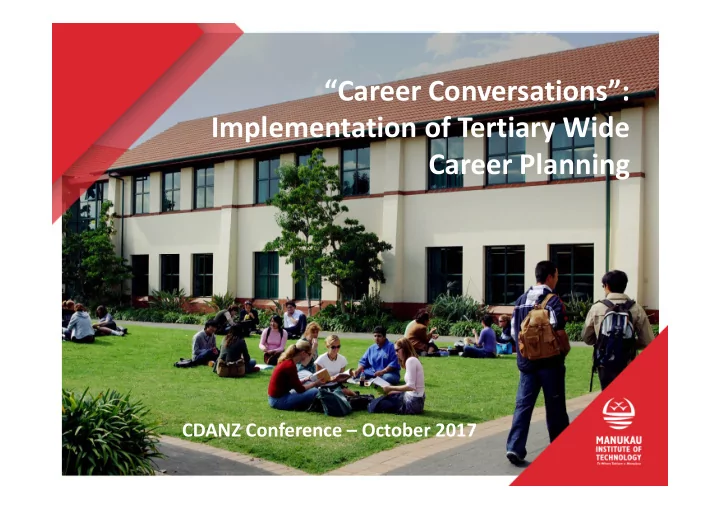

“Career Conversations”: Implementation of Tertiary Wide Career Planning CDANZ Conference – October 2017
Introduction to MIT Transformation Project Career Conversations Course Implementation and challenges
7 Faculties / 7 Campuses Engineering and Trades Education and Social Sciences Business and IT Nursing and Health Maritime and Logistics Consumer Services Creative Arts
Student Profile BY TARGET GROUP [SERIES [SERIES Inter- TOTAL ENROLLED STUDENTS national NAME] NAME] [VALUE] [VALUE] [VALUE] 14,128 (6,519 EFTS) BY PROGRAMME TYPE Degree Diploma BY AGE GROUP Graduate 54% [VALUE Diploma ] Under 25 Over 25 Certificate & Awards
Transformation Project Workstreams Programme redevelopment Work spaces Capability LMS (Canvas) Pathways to Employment Career Conversations course • Every student, when they first start at MIT, will have a career conversation CES Online • Online recruitment portal
Career and Employment Solutions @ MIT Career Solutions Employment Solutions
Career Conversations Course… What is Career Conversations? Supporting students in their career development and into great jobs Online course and Career Plan Theory based course A non assessed career planning course Unique to MIT Why have we developed this Career Conversations course? Introduces the concept of career development To help students understand themselves and their career choices A framework for ongoing career planning To improve employability outcomes Tertiary Career Benchmarks
Career Conversations Course… https://canvas.manukau.ac.nz/courses/29105
Development Phase Creation of course in Canvas (LMS) Content creation • Online course design (contractor / Career Solutions staff) • Career Plan (Excel, Google docs, Word doc) Feedback from students and staff Review and design modification
Pilot Phases Trialled with Faculty of Creative Arts / Consumer Services • Various methods of delivery trialled • Promoting the course: • – Roadshow across MIT – Talking to Programme Leaders – Intranet, Internal newsletters 31 programmes (465 students) / 95 students completed • Most successful method of delivery • Volunteer/ shoulder tap Lecturers for next phase •
Challenges • New digital platform (limitations) – Staff and students not engaged with LMS • Academic staff buy-in – Time (staff delivery, student commitments) – Concerns over staff expertise required – Compulsory vs voluntary • Literacy level required for MIT wide delivery • Career planning already being done in courses
Next Steps Which model will we use? Automatic enrolment into course Roll out through Schools and Liaison team Available to prospective students via MIT website During tertiary preparation courses
Q & A
Recommend
More recommend